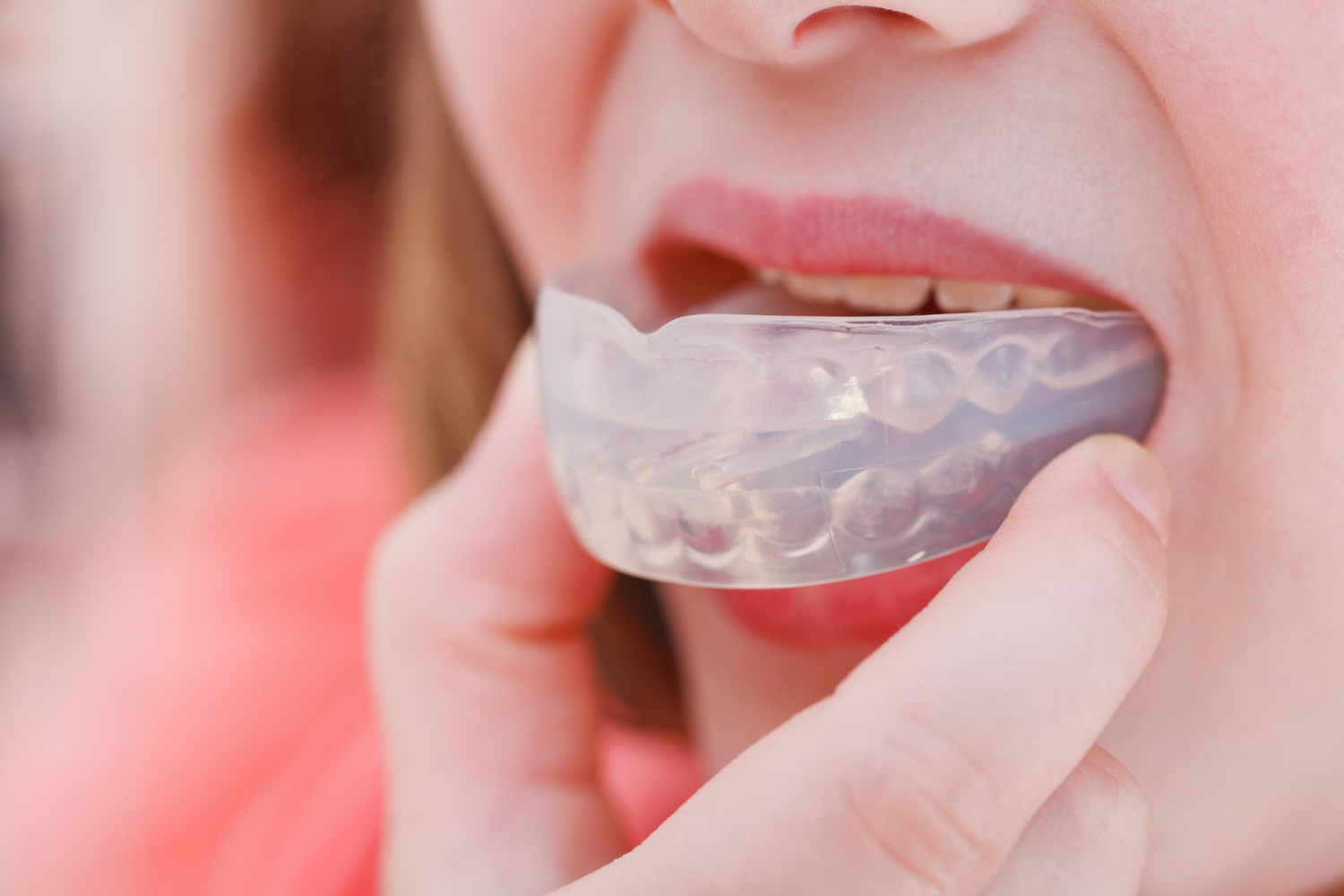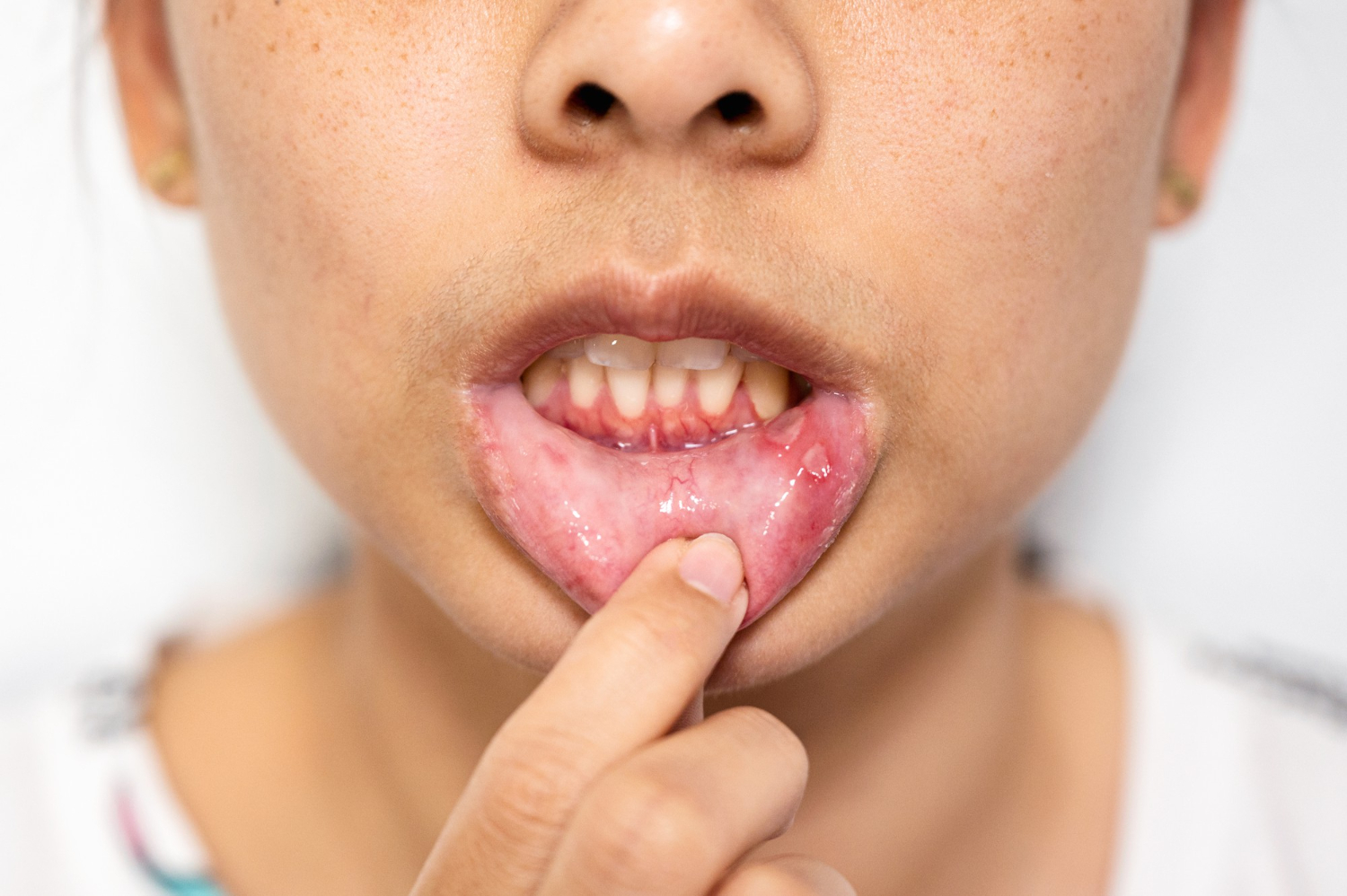Mouth Ulcer: Symptoms, Causes, Treatments & Preventions
Mouth ulcers, also called canker sores, are small sores that can appear inside the mouth on the tongue, gums, and inner cheeks. These sores can cause discomfort and pain, making it difficult to eat and speak. Mouth ulcers are a common oral health issue, with estimates suggesting that 20% of the general population will develop at least one mouth ulcer at some point in their lifetime. Mouth ulcers can occur at any age, but they are more common in adolescents and young adults. This article will explore the causes, symptoms, and treatment options for mouth ulcers. It will also provide suggestions on preventing mouth ulcers and managing the discomfort they can cause.
In this article
- What is a dental night guard?
- Types of nightguards
- Where can you purchase a mouthguard?
- Can you wear a mouthguard over braces or aligners?
- How to look after your new nightguard?
- How long does a mouthguard last?
- Are there any disadvantages to wearing a night guard?
- Final words
- Final words
- Final words
Difference between mouth ulcers and cold sores
Mouth ulcers and cold sores are both common oral health issues. However, there are several key differences between the two.
One of the main differences between mouth ulcers and cold sores is the cause of the sores. Mouth ulcers develop inside the mouth due to trauma or injury, allergic reactions, hormonal changes, infections, certain medications, or nutritional deficiencies. On the other hand, cold sores are caused by the herpes simplex virus (HSV). Cold sores are contagious and are typically transmitted through close contact with an infected person.
Another difference between mouth ulcers and cold sores is the location of the sores. Mouth ulcers can develop anywhere inside the mouth, including on the tongue, gums, and inner cheeks. On the other hand, cold sores typically develop on or around the lips and may also appear on the nose or chin.

Who is more susceptible to developing mouth ulcers?
People of all ages can develop mouth ulcers. However, they are more common in adolescents and young adults. A mouth ulcer is typically less of a medical emergency than an inconvenience.
Several factors may increase the likelihood of developing mouth ulcers, including a family history of the condition, certain medical conditions, such as diabetes, Behcet’s disease, inflammatory bowel disease, or celiac disease, and certain medications, such as nonsteroidal anti-inflammatory drugs (NSAIDs) or oral contraceptives.
Symptoms of mouth ulcers
Some of the common symptoms of mouth ulcers include:
- Painful or discomfort when eating or speaking
- Small, shallow sores inside the mouth
- Swelling or redness around the sores
- Burning or tingling sensation around the affected area
Mouth ulcers can range from small to large and may be round or oval. They can be red, yellow, or white and may have a raised, bumpy surface.
Causes of mouth ulcers
There are several potential causes of mouth ulcers, including:
Trauma or injury to the mouth: Mouth ulcers can be caused by physical trauma, such as biting the inside of the cheek or tongue or wearing poorly fitting dentures.
Nutritional deficiencies: A lack of certain nutrients, such as iron, zinc, folic acid, or vitamin B12, can lead to mouth ulcers.
Allergic reactions: Mouth ulcers can be triggered by allergies to certain foods or other substances, such as dental materials or cosmetics.
Hormonal changes: Hormonal fluctuations, such as those that occur during menstruation or menopause, can increase the risk of developing mouth ulcers.
Infections: Certain infections, such as thrush or herpes simplex virus (HSV), can cause mouth ulcers.
Certain medications: Some medications, such as NSAIDs or oral contraceptives, can increase the risk of developing mouth ulcers.
Stress and anxiety: High stress or anxiety levels can lead to mouth ulcers.
It’s important to note that the exact cause of mouth ulcers can be challenging to determine, and in many cases, multiple factors may be involved.
How are mouth ulcers diagnosed?
Mouth ulcers, also known as canker sores, are usually diagnosed based on a visual examination of the affected area. In most cases, a healthcare provider can diagnose mouth ulcers by simply looking at the sores.
If the healthcare provider is uncertain of the diagnosis, they may order additional tests to rule out other conditions or to determine the underlying cause. These tests may include the following:
- A culture of the affected area to check for infections
- A biopsy of the affected area to check for underlying medical conditions
- Blood tests to check for nutritional deficiencies or other underlying medical conditions
Several other conditions may be mistaken for mouth ulcers or may co-occur with mouth ulcers. These conditions include:
Cold sores: Cold sores, also known as herpes labialis, are caused by the herpes simplex virus (HSV) and typically appear on or around the lips.
Aphthous stomatitis: Aphthous stomatitis, also known as aphthous ulcers, is a common condition that causes recurrent mouth ulcers. Aphthous ulcers are usually round or oval in shape and range in size from small to large.
Leukoplakia: It is a condition in which white patches or lesions appear on the tongue, gums, or inner cheeks. These patches or lesions may be benign (non-cancerous) or precancerous.
Lichen planus: Lichen planus is a chronic autoimmune condition that causes flat-topped, purple, or white bumps to appear on the skin or mucous membranes, including inside the mouth.
See a healthcare provider if you are experiencing persistent or recurrent mouth ulcers or if the mouth ulcers are particularly large or severe. The provider can help determine the cause of the mouth ulcers and recommend the appropriate treatment.
Treatment options
Several treatment options are available for mouth ulcers. These options can help reduce pain and promote healing. Here are some of the common treatment options:
Over-the-counter topical treatments: These are medications that you can buy without a prescription. They come in gels, creams, or ointments, and you apply them directly to the affected area. These products may contain ingredients such as benzocaine, hydrocortisone, or dimethicone. These ingredients can help reduce pain and swelling.
Prescription medications: If your mouth ulcers are more severe, your healthcare provider may prescribe a stronger medication. These medications are only available with a prescription. One example is a corticosteroid, which can reduce inflammation and pain.
Home remedies: Some people find relief from mouth ulcers using home remedies. One example is rinsing the mouth with salt water. You can also apply a mixture of baking soda and water to the affected area. These remedies help reduce pain and promote healing.
Also read: 8 Home Remedies for Toothache Relief
Lifestyle changes: Changing your diet and lifestyle may also help reduce the frequency and severity of mouth ulcers. This may include increasing your intake of nutrients such as iron, zinc, folic acid, and vitamin B12. It’s also essential to manage stress through relaxation or stress-management strategies.
Talking to your healthcare provider about treatment options is a good idea. They can help determine the most appropriate course of treatment based on the severity and underlying cause of your mouth ulcers. In some cases, a combination of treatment approaches may be necessary to manage mouth ulcers effectively.
How long does it take to heal mouth ulcers?
Mouth ulcers usually heal on their own within a week to ten days. However, the amount of time it takes for a mouth ulcer to heal can vary depending on the size and severity of the ulcer and the underlying cause.
While mouth ulcers heal, practice good oral hygiene by brushing and flossing regularly and avoiding spicy or acidic foods that can irritate the affected area. Using over-the-counter topical treatments or prescribed medications as directed can also help reduce pain and promote healing.
If mouth ulcers are persistent or severe, or if other symptoms accompany them, it is vital to see a healthcare provider for proper evaluation and treatment.
How to prevent mouth ulcers?
Several strategies can help prevent the development of mouth ulcers. These strategies include:
Practice good oral hygiene: Brushing and flossing regularly can help prevent the buildup of bacteria and food particles in the mouth. These bacteria and food particles can irritate the mucous membranes and lead to the development of mouth ulcers.
Avoid spicy or acidic foods: Spicy or acidic foods can irritate the mucous membranes and increase the risk of developing mouth ulcers. It may be helpful to avoid or limit these foods while mouth ulcers are healing or to use a straw to bypass the affected area when consuming them.
Avoid biting the inside of the cheek or tongue: Biting the inside of the cheek or tongue can cause trauma to the mucous membranes and increase the risk of developing mouth ulcers.
Use a soft-bristled toothbrush: A toothbrush with soft bristles can help prevent irritation and trauma to the mucous membranes.
Manage stress: High levels of stress and anxiety can increase the risk of developing mouth ulcers. Practicing relaxation techniques or stress-management strategies may help reduce the risk of developing mouth ulcers.
Eat healthily: A diet rich in nutrients such as iron, zinc, folic acid, and vitamin B12 may help reduce the risk of developing mouth ulcers.
Avoid certain medications: Some medications, such as nonsteroidal anti-inflammatory drugs (NSAIDs) or oral contraceptives, can increase the risk of developing mouth ulcers. If you are taking these medications and are experiencing recurrent mouth ulcers, talk to your healthcare provider about alternative treatment options.
When to see a doctor for mouth ulcers?
It is generally recommended to see a healthcare provider if you are experiencing persistent or recurrent mouth ulcers. A healthcare provider can help determine the underlying cause of the mouth ulcers and recommend the appropriate treatment. You must contact your healthcare professional if you have the following:
- Ulcers that last three weeks or more
- Ulcers that develop before the previous ones have healed
- Mouth ulcers that harm the outer layer of your lips
- Pain that does not get better with treatment
- Unusually large mouth ulcers
- A fever
- Diarrhea
Conclusion
Mouth ulcers can be painful and uncomfortable, even though they are typically not dangerous. Fortunately, multiple treatments and home remedies can reduce your symptoms while your lesions heal. Practicing good oral hygiene, avoiding spicy or acidic foods, and managing stress can help prevent the development of mouth ulcers. If you are experiencing persistent or severe mouth ulcers, you must see a healthcare provider for proper evaluation and treatment.

